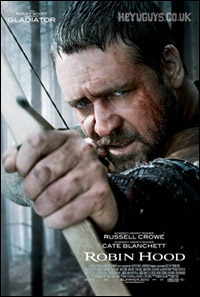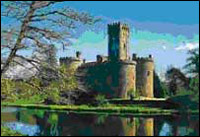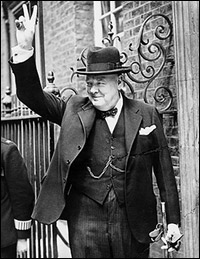 Have you visited your local cinema yet to see the new Russell Crowe starring, Ridley Scott directed Robin Hood? What did you think? As someone who has researched this time period and the individuals involved, the film doesn’t do a bad job with the history. With the exception of King Philip’s desire to invade England, which is kind of the whole third act. As far as we know, it never happened. Nor did Philip send mercenaries to England to attack the baronies and turn the baron’s against King John. Old John did a good enough job of that on his own.
Have you visited your local cinema yet to see the new Russell Crowe starring, Ridley Scott directed Robin Hood? What did you think? As someone who has researched this time period and the individuals involved, the film doesn’t do a bad job with the history. With the exception of King Philip’s desire to invade England, which is kind of the whole third act. As far as we know, it never happened. Nor did Philip send mercenaries to England to attack the baronies and turn the baron’s against King John. Old John did a good enough job of that on his own.
Crowe and Scott chose to put forth the story of Robin Hood as a commoner. In the movie he is Robin Longstride, an archer in King Richard’s army. There is a fairly interesting back-story to his character which is revealed in the film. Cate Blanchett is Marion (she has become the ‘go to’ actress for these types of ‘strong historical women’). The costumes and settings are for the most part well done and accurate, (except for a really dopey scene where Robin and the ‘Merry Men’ plant seed corn by moonlight).
All in all I gave the movie a B. There are worse ways to spend your money, and this movie is far better entertainment than the Kevin Costner Robin Hood: Prince of Thieves debacle of the early nineties. And that’s kind of the point of a movie like this. As I’ve said many times before, Hollywood is not interested in history, only in entertainment. They are never going to let the facts get in the way of a good story and that’s how it should be.
Here is my ‘quick hits’ list of the history, the movie got right.
 The film opens with the siege of Chalus. Richard the Lionheart is on his way home from the Crusades and has nearly bankrupted England. He is forced to try to seize this castle so that he can pay and feed his army. It does a pretty good job of depicting siege warfare and it gets it right when Richard is killed by a crossbow bolt after riding too close to the castle.
The film opens with the siege of Chalus. Richard the Lionheart is on his way home from the Crusades and has nearly bankrupted England. He is forced to try to seize this castle so that he can pay and feed his army. It does a pretty good job of depicting siege warfare and it gets it right when Richard is killed by a crossbow bolt after riding too close to the castle.- Eleanor of Aquitaine was the power beyond the throne while Richard was away. Richard was her favorite and she basically kept the kingdom together while he was away crusading.
 There is a great scene where in the ‘never happened’ attack of Philip’s forces they are greeted by a raft of English arrows. It’s pretty funny that the French eschewed the use of archers during the Middle Ages. It cost them more than once. They consider it a ‘dishonorable’ weapon. At the Battle of Agincourt, the French threatened to cut off the first two fingers on both hands, of any archer they captured. (Thereby preventing them from drawing a bowstring) Of course they were soundly defeated and the English archers delighted in waving their still attached fingers at the French. This is one of the supposed origins of the “V is for Victory” which became common in later wars.
There is a great scene where in the ‘never happened’ attack of Philip’s forces they are greeted by a raft of English arrows. It’s pretty funny that the French eschewed the use of archers during the Middle Ages. It cost them more than once. They consider it a ‘dishonorable’ weapon. At the Battle of Agincourt, the French threatened to cut off the first two fingers on both hands, of any archer they captured. (Thereby preventing them from drawing a bowstring) Of course they were soundly defeated and the English archers delighted in waving their still attached fingers at the French. This is one of the supposed origins of the “V is for Victory” which became common in later wars.- Prince John snivels. He’s very sniveling.
- Prince John did not likely burn the ‘Magna Carta’ but he did go back on his word. The barons again had to come together to smack him around.





